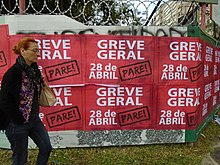Brazilian Sign Language is the sign language used by deaf communities of Brazil. It is commonly known in short as Libras.
The samba school Imperatriz Leopoldinense was created on March 6, 1956 in the suburb of Ramos, in Rio de Janeiro. It is named after Maria Leopoldina, archduchess of Austria and Empress of Brazil, consort of Emperor Pedro I.

José Aldo Rebelo Figueiredo is a Brazilian politician and a federal deputy elected by the state of São Paulo. He was President of the Chamber of Deputies of Brazil from 2005 to 2007.

Podemos, previously known as the National Labour Party is a centre-right Brazilian political party. Historically labourist and Janist, since 2016 the party shifted its focus to support anti-corruption policies and direct democracy.
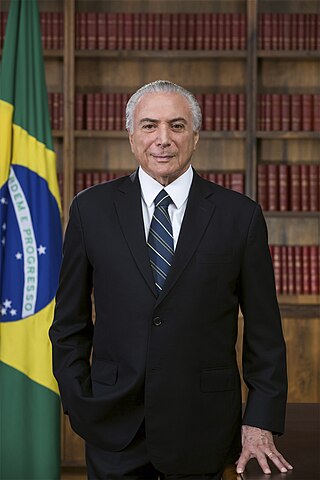
Michel Miguel Elias Temer Lulia is a Brazilian politician, lawyer and writer who served as the 37th president of Brazil from 31 August 2016 to 1 January 2019. He took office after the impeachment and removal from office of his predecessor Dilma Rousseff. He had been the 24th vice president of Brazil since 2011 and acting president since 12 May 2016, when Rousseff's powers and duties were suspended pending an impeachment trial.

Partido da Imprensa Golpista is a term used by left-wing Brazilian websurfers since 2007 to characterize an alleged attitude of the Brazilian mass media towards President Luiz Inácio Lula da Silva during the 2006 presidential election. The term was popularized by journalist Paulo Henrique Amorim in his blog. Whenever he uses the term, Amorim writes it with an "i" in lowercase as a pun with the name of the web portal "iG". where he was a journalist before he was dismissed on March 18, 2008, which he describes as a process of "ideological cleansing".

Corruption in Brazil exists on all levels of society from the top echelons of political power to the smallest municipalities. Operation Car Wash showed central government members using the prerogatives of their public office for rent-seeking activities, ranging from political support to siphoning funds from state-owned corporation for personal gain. The Mensalão scandal for example used taxpayer funds to pay monthly allowances to members of congress from other political parties in return for their support and votes in congress. Politicians also used the state-owned and state-run oil company Petrobras to raise hundreds of millions of reais for political campaigns and personal enrichment.

General elections were held in Brazil on 7 October 2018 to elect the president, National Congress and state governors. As no candidate in the presidential election received more than 50% of the vote in the first round, a runoff round was held on 28 October.
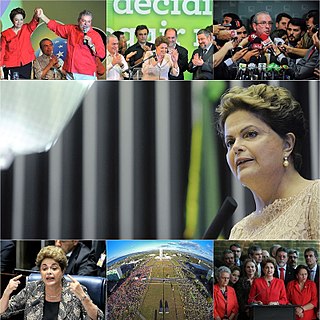
The impeachment of Dilma Rousseff, the 36th president of Brazil, began on 2 December 2015 with a petition for her impeachment being accepted by Eduardo Cunha, then president of the Chamber of Deputies, and continued into late 2016. Dilma Rousseff, then more than 12 months into her second four-year term, was charged with criminal administrative misconduct and disregard for the federal budget in violation of article 85, items V and VI, of the Constitution of Brazil and the Fiscal Responsibility Law, Article 36. The petition also accused Rousseff of criminal responsibility for failing to act on the scandal at the Brazilian national petroleum company, Petrobras, on account of allegations uncovered by the Operation Car Wash investigation, and for failing to distance herself from the suspects in that investigation.

Benevenuto Daciolo Fonseca dos Santos, known as Cabo Daciolo, is a Brazilian military firefighter, pastor and politician affiliated to Republicans. In 2014, he was elected federal deputy. He was expelled from the Socialism and Liberty Party (PSOL) in 2015 and later affiliated to the Labour Party of Brazil, Patriota, Podemos (PODE), Liberal Party and the Brazilian Woman's Party (PMB).

The 2018 Brazil truck drivers' strike, also called the diesel crisis, was a strike of self-employed truck drivers that began on 21 May 2018.
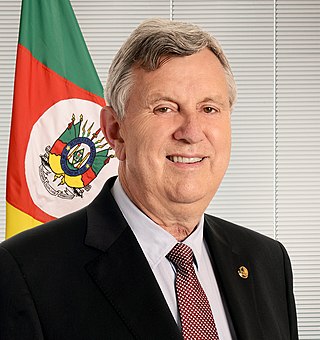
Luis Carlos Heinze is a federal senator of Brazil representing his home state of Rio Grande do Sul. He was previously served in the Chamber of Deputies from 1999 to 2019 and was mayor of São Borja from 1993 to 1996.

Admar Gonzaga Neto is a Brazilian politician, attorney, jurist and current General Secretary of Alliance for Brazil (APB). He was Justice of the Superior Electoral Court (TSE), nominated by Michel Temer to the seat destinated to attorneys. With electoral career since 1993, Admar was member of the Jurists Special Committee created to propose changes to the Electoral Code.
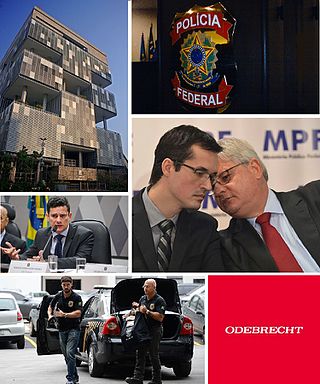
The Odebrecht–Car Wash leniency agreement, also known in Brazil as the "end of the world plea deal", was the leniency agreement signed between Odebrecht S.A. and the Public Prosecutor's Office (PGR) in December 2016, as part of Operation Car Wash. The agreement provided for the deposition of 78 of the contractor's executives, including the former president Marcelo Odebrecht, and his father, Emílio Odebrecht, which generated 83 investigations at the Supreme Federal Court (STF).

The 2021 Brazilian protests were popular demonstrations that took place in different regions of Brazil in the context of the COVID-19 pandemic. Protests both supporting and opposing the government happened.

Hamilton Moreira de Assis, known as Hamilton Assis, is a Brazilian labor leader, left-wing activist, teacher, and politician from Salvador, Bahia. A former director of the Central Única dos Trabalhadores (CUT) in Bahia, he has run for office several times as a member of the Socialism and Liberty Party (PSOL), most recently in 2018 where he stood as an unsuccessful candidate for the party's presidential nomination. Over the course of his career, Assis has held positions in the Bahia chapters of both PSOL and the Workers' Party (PT).
LHT HIGGS Produções Audiovisuais LTDA, better known by its trade name Brasil Paralelo, is a Brazilian company founded in 2016, in Porto Alegre, that produces documentaries offering conservative viewpoints on politics, history and current events. The videos are published on YouTube and have been shown since December 9, 2019 on TV Escola, a state television channel linked to the Ministry of Education and, since April 6, 2021, on the Panflix platform of the Jovem Pan group.
The following tables and graphs show the popularity indexes of Michel Temer presidency. One table and graph show the result of opinion polls made about how the population evaluates the government, and the other ones show the government comparative with the previous one, of former President Dilma Rousseff.
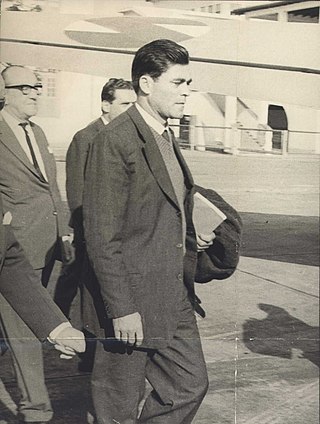
Paulo de Mello Bastos was a former leader of the National Union of Aeronauts, a former leader of the General Workers Command and a former Varig pilot whose resignation in 1963 inspired a general strike in the country.

The 2016–2017 Brazilian protests were popular demonstrations that took place in different regions of Brazil after Dilma Rousseff's impeachment. The marches were marked by the slogan "Fora Temer".
